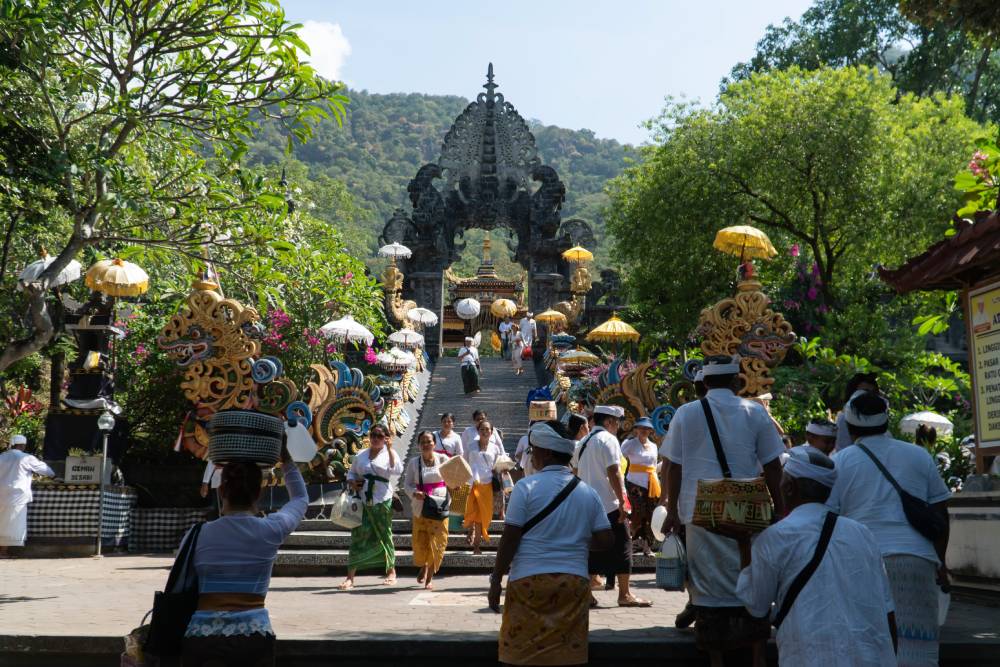The island of Bali, Indonesia was visited by more than 6 million international tourists in 2024, and it’s one of the most popular travel destination in Southeast Asia.
But how safe is it? The short answer to this question is that Bali is very safe. It’s safer than most places in the world. I’d also happily recommend it to families and solo travelers.
However, the long answer is a bit more nuanced and there are at least a few good things you should know before you go to Bali.
In this blog post, I’ll address some common safety questions such as crime, traffic, monkeys, volcanoes, and more. I’ll also share my tips for staying safe from these things when you travel to Bali.
Background: My Experience In Bali
First of all, let me introduce myself and talk about my level of personal experience in Bali.
I’m an American who’s lived here since 2019, and I married a local Balinese. My wife Intan was born and raised on the island. Between the two of us, we have quite a bit of experience in Bali, with multiple perspectives (foreigner and local).
We’ve spent many days traveling all over every corner of the island, interacting with locals, hiking the volcanoes, doing the usual tourist activities, and also visiting many places that are well off the beaten path.

Bali is our happy place
Safety In Bali: What To Know
• Violent Crime
Indonesia has one of the lowest murder rates in the world, with a rate of 0.3 per 100k inhabitants, according to the United Nations yearly study. This is 92% lower than the global average.
Compared to my home country, the United States, the murder rate in Indonesia is almost 20 times lower. It’s also safer than nearby countries like Thailand and the Philippines. Guns are strictly controlled in Indonesia, and there aren’t any shootings.
In Bali, it’s rare to hear about violent crime, and murders are almost unheard of. The Balinese locals are known for their gentleness and friendliness. They’re some of the nicest people you’ll ever meet.



Balinese people are so friendly
• Terrorism
There’s a risk of terrorism anywhere in the world, and that includes Bali. The island was bombed by Muslim extremists in 2002 and 2005, but there haven’t been any incidents in the 20+ years since then.
The Indonesian government is serious about stopping terrorists, and there’s been a decline in these kinds of incidents across the whole country in recent years, except for some unrest from separatists in West Papua.
Bali is unique in Indonesia for being a Hindu majority island, whereas most of the country is Muslim, but I’ve also spent years traveling the other islands and those are safe too.

The 2002 Bali bombing memorial in Kuta
• Theft
Like all places in the world, there is theft in Bali. It’s not exceptionally common. There aren’t iron bars covering all the doors and windows, like you’d see in Central or South America.
Armed robberies don’t really ever happen here, and I’ve carried expensive cameras and drones all over Bali (and the rest of Indonesia) without any issues.
However, burglaries and thefts do happen in Bali, and private villas seem to be targeted more than hotels because thieves know they’re usually unstaffed. They’re also more likely to be rented by well-to-do foreigners, so they know they have a better chance of finding valuables.
Regardless of whether you stay in a hotel or a villa, it’s a good idea to lock up or hide your valuables anytime you go out. Cash is especially easy to steal and you should never leave it in a hotel room anywhere in the world.
Another thing to be aware of in Bali is drive-by phone snatchings. These are especially common in areas like Kuta, so just remember to put away your phone when you’re by a busy road with passing motorbikes.

The monkeys can be thieves too!

Sanur is a nice and quiet area for families in Bali
• Scams
Bali isn’t the scammiest place in the world, but it does have a few common tricks to watch out for.
First of all, there are lots of unofficial money changers in the tourist areas of Bali, and they’ll short-change you or use sleight-of-hand tricks to keep one or two bills for themselves.
You can avoid this by only using ATMs or official money changers, and counting your cash twice before leaving. The legit money changers will always have a proper building with air conditioning.
Ignore the little street stands offering exchange rates that seem too good to be true. Those guys are always scammers.

Sekumpul Waterfall is beautiful, but scammers abound!
Another pet peeve of mine is the local ‘hiking mafia’ in Bali that tries to force you to hire a guide at popular places like Mount Batur or Sekumpul Waterfall, even though it’s not really needed.
The hiking mafia will go to great lengths to convince you that the trail is dangerous or confusing, and you need their help to do it. If you refuse, they might even threaten or intimidate you.
This is technically illegal, and the Bali government has half-heartedly tried to put a stop to it at places like Sekumpul, but enforcement is lax, so the scamming continues to this day. The ‘mafia’ at Batur is the worst.
There are ways you can avoid the ‘mafia’ and hike without a guide, but it’s not exactly easy. I’ve written more info about how to do it in my individual travel guides for each of these places in Bali.

Mount Batur is a famous hike in Bali where ‘mafia’ scammers will force you to hire a guide
• Roads & Traffic
Bali has narrow roads, heavy traffic, and a mixture of cars and motorbikes competing for the right of way, making it a difficult place to drive.
Motorbike accidents are one of the biggest safety risks in Bali, and it seems like there are new stories every day of foreign tourists getting killed or seriously hurt on motorbikes. Usually they’re driving without helmets.
I wouldn’t recommend driving a motorbike in Bali unless you have plenty of experience and know-how, and you should absolutely wear a high quality helmet as well.
Even then, you’re much safer in a car in this kind of environment. Yes, it costs more, but it’s nowhere near as expensive as ending up in the hospital with major injuries.
Thankfully, it’s pretty affordable to hire a private driver in Bali. You can even use the Grab or GoJek apps for short distance taxi rides with either a car or motorbike. They’re cheap, safe, and efficient.
For longer day trips, GetYourGuide has drivers you can book online, and the prices start at 700k Rupiah (~$48 USD) for a full day of driving and sightseeing with a car for up to 10 hours, with 1-5 passengers!

Beep beep. Don’t try this on the main road!
• Food Safety (‘Bali Belly’)
After many years of visiting Bali, trying all the food, and generally eating like a pig, I’ve never gotten any kind of sickness from food. And I eat everything, including fresh fruit, salad, spicy food, and street food.
In my opinion, ‘Bali belly’ is overhyped. I don’t personally know anyone who has ever had it, including any of my other expat or tourist friends.
I think part of the ‘Bali belly’ reputation came from 20+ years ago, when food safety in Bali was worse than it is now.

Fruit smoothie bowl. Yum.
There’s also the possibility that some people think they’re experiencing ‘Bali belly’ when it’s actually something else entirely.
I’m sure there’s seasonal sickness that gets carried into Bali from ‘snowbird’ travelers escaping their home countries in the winter, and some people probably mistake these normal viruses for ‘Bali belly’ because the symptoms are similar.
In any case, every person’s stomach is different, so if you tend to be sensitive to new foods then you may want to start out slowly and avoid spicy food when you first get to Bali.

I love Bali
• Volcanoes
Bali is home to two active volcanoes: Mount Agung and Mount Batur.
It’s possible for either of these to erupt at any time, and Mount Agung did have a major eruption in 2017-2019, when it exploded with a giant 4 kilometer tall ash cloud.
In 1963, a catastrophic eruption from Agung wiped out the nearby villages and killed 2,000 local people.
However, these volcanoes are located far from the main tourist areas in Bali, so they pose almost no risk to the average Bali tourist, even if they erupt.
People even hike the volcanoes, and they’re monitored for seismic activity nowadays. I’ve hiked both of them multiple times.

Mount Agung eruption in 2017 (© Shutterstock)

Mount Agung eruption in 2017 (© Shutterstock)
• Earthquakes
One of the unnerving realities of life in Indonesia is that the whole country, including Bali, sits directly on the Pacific Ring of Fire, a tectonic belt of volcanoes and earthquakes. About 90% of the world’s earthquakes happen in this zone.
I was in Bali when the 7.0 earthquake hit Lombok in 2018, and it was a scary experience. It rattled our hotel, spun our ceiling fan a few times, and even made waves in the pool.
On the nearby island of Lombok, the earthquake did a lot more damage and killed almost 600 people. And that’s nothing compared to the 2004 earthquake and tsunami in Sumatra, Indonesia, which killed almost 230,000 people.
What’s keeping the same tragedy (or worse) from happening in Bali someday? Nothing, really. But the thing about earthquakes is that it’s impossible to predict when the next big one might happen. It could be tomorrow, or it could be 1,000 years from now.
If you’re ever caught in a strong earthquake that lasts a long time, you should try to get away from buildings and the beach, and seek higher ground in case the earthquake triggers a tsunami.
If that’s not possible, you should at least take cover in bed and protect your head and neck with a pillow. Avoid windows and glass. You can also download the BMKG app for real-time alerts and info about any nearby earthquakes.

Famous lake temple in Bali — Ulun Danu Beratan

A drone pic of the coastline in Nusa Penida
What About Animals?
• Dogs
Stray dogs are common in some areas of Bali, and they’re generally harmless, but if you happen to be bitten by one, you should go get a rabies vaccine immediately.
Rabies was once eliminated in Bali, but it’s rebounded in recent years and there have been serious outbreaks where hundreds of dogs tested positive and some people even died.
Bali really needs better vaccination and sterilization programs. Dogs are the main vector for the rabies virus, and rabies has a 100% fatality rate in humans if you delay treatment long enough to become symptomatic.
Don’t take a chance with this. Any dog bite in Bali should be treated with a rabies shot as soon as possible.

The dogs are cute, but they can carry rabies.
• Monkeys
One of the fun things about being in Bali is that you’ll commonly see monkeys (long tailed macaques), especially in places like Ubud, Uluwatu, and north Bali.
You can take pictures and even selfies with them at the Ubud or Sangeh Monkey Forests, which are home to more than 1,000 semi-wild monkeys.
Personally, I love the monkeys and it’s one of the things that inspired my first trip to Bali.

Intan with a shoulder monkey
So are the monkeys dangerous or not? Do they carry rabies or other diseases?
On internet forums there’s a lot of worrying and hand wringing about this, but the simple fact is that there’s never been a case of rabies contracted at any Bali monkey forest even though they’re visited by up to 10,000 tourists per month.
The monkeys have been studied and tested by international scientists, and in 2023, the Bali authorities even started mass vaccinating the monkeys for rabies as a precaution.
You’ll still want to follow some rules to avoid getting bit or robbed by the cheeky animals if you decide to go there. I wrote a complete guide for visiting the Bali monkey forests, which you can read in the links below.
Read More: Ubud Monkey Forest / Sangeh Monkey Forest

Monkey crossing! Take care your stuff! I love this sign.

Monkey trying to steal my hat
• Snakes
Bali is home to six different species of dangerous / venomous snakes, and many more non-venomous species.
Generally you don’t need to worry about snakes in the touristy areas of Bali, and they’re reluctant to bite unless they’re grabbed or stepped on. In fact, they try to avoid humans altogether.
However, if you do encounter a snake in Indonesia, you should always assume it’s a venomous species unless you’re sure it isn’t. And if you decide to go anywhere off the beaten path in Bali, running into snakes can become more of an issue.

Island Pit Viper in Bali
One time I almost stepped on a venomous Island Pit Viper while hiking in Nusa Penida island, in a less traveled part of the island with lots of foliage (this wasn’t in a popular tourist area).
My foot landed within centimeters of the snake, which was coiled up in the center of the path, but thankfully its head was turned away from me and it didn’t see how close my foot landed.
That was a very close call. I backed up and watched the snake for awhile, and then he crawled away into the trees.
If you’re interested in learning more about snakes in Bali and how to identify the dangerous ones, I wrote a complete guide for this and took photos of each of the species with help from a professional snake catcher. You can read it in the link below.
Read More: Snakes In Bali

Me with a King Cobra in Bali. This pic was taken with a pro snake catcher.
• Mosquitoes
Since Bali is a tropical island, there are also mosquitoes to watch out for.
Malaria is eliminated in Bali, which is great to know, because it’s the world’s most dangerous mosquito-borne disease by far.
However, there are three other diseases you can catch from mosquitoes in Bali: dengue fever, chikungunya, and Japanese encephalitis.
These are rarely fatal, but they can cause extremely painful and debilitating short term sickness. You don’t want them.
To protect yourself from mosquitoes in Bali, avoid sleeping with your windows open unless you have a net over the bed, and wear repellant when you’re active outdoors, especially in rural areas.
If you’re on the beach or indoors, mosquitoes usually won’t bother you.

Calming landscape of the Jatiluwih rice terraces in Bali
Other Frequently Asked Questions
- Is Bali safe for solo travelers?
Yes, Bali is very safe for solo travelers, including females. Lots of women travel to Bali alone. Just follow normal precautions. I was by myself on my first trip to Bali, and I stayed for 2 months with no issues at all.
- Are any vaccines needed?
Vaccines aren’t formally required for traveling to Bali, and most people don’t bother with it, but it’s a good idea to have up to date shots for Tetanus, Typhoid, and Hepatitis A.
- What about LGBT travelers?
Balinese people are very tolerant and the island is safe for gay or LGBT travelers, but Indonesia is a conservative country so it’s wise to be discreet and respectful. PDA is generally frowned upon for both gay and straight couples here.
- Are there spiders in Bali?
Yes, there are many kinds of spiders in Bali, but thankfully none that are known to be dangerous to humans.
- Is there good healthcare?
Yes, Bali has some good hospitals nowadays. A few of the top options are BIMC, Siloam, and Sanglah, which are all located near the main tourist areas. They’re generally cheaper than Western hospitals, but can still be expensive for major treatments, so you might want to have travel insurance.
More Bali Travel Tips
Thanks for looking! I hope you enjoyed these safety tips for visiting Bali.
I’ve written hundreds of other travel guides for Bali, so don’t forget to check those out while planning your trip!


